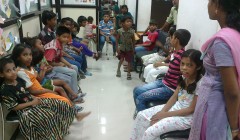
Disability check-up health camps in rural and slum areas target the people who are in need but not aware enough to contact the services for help. We provide counseling and vocational guidance to the children suffering from physical and mental problems. We enroll these cases in our center and provide free medical consultancy. We provide them with an atmosphere where they not only lead a normal life but also get free medical consultancy, counseling and vocational services to not only the physically disabled but mentally challenged too.
What is Disability
Disabilities are an umbrella term, covering impairments, activity limitations, and participation restrictions. Impairment is a problem in body function or structure; an activity limitation is a difficulty encountered by an individual in executing a task or action; while a participation restriction is a problem experienced by an individual in involvement in life situations. Thus disability is a complex phenomenon, reflecting an interaction between features of a person’s body and features of the society in which he or she lives.
A disability may be present from birth, or occur during a person’s lifetime.
Types of Disability :
- Physical Disability : Any impairment which limits the physical function of limbs or fine or gross motor ability is a physical disability.
- Sensory Disability : Sensory disability is impairment of one of the senses. The term is used primarily to refer to vision and hearing impairment, but other senses can be impaired.
- Visual Impairment :Visual impairment (or vision impairment) is vision loss (of a person) to such a degree as to qualify as an additional support need through a significant limitation of visual capability resulting from either disease, trauma, or congenital or degenerative conditions that cannot be corrected by conventional means, such as refractive correction, medication, or surgery. This functional loss of vision is typically defined to manifest with
- best corrected visual acuity of less than 20/60, or significant central field defect
- Significant peripheral field defect including homonymous or heteronymous bilateral visual, field defect or generalized contraction or constriction of field, or reduced peak contrast sensitivity with either of the above conditions.
- Hearing Impairment :Hearing impairment or hard of hearing or deafness refers to conditions in which individuals are fully or partially unable to detect or perceive at least some frequencies of sound which can typically be heard by most people. Mild hearing loss may sometimes not be considered a disability.
- Olfactory and Gustatory Impairment : Impairment of the sense of smell and taste are commonly associated with aging but can also occur in younger people due to a wide variety of causes. There are various olfactory disorders:
- Anosmia – inability to smell
- Dysosmia – things smell different than they should
- Hyperosmia – an abnormally acute sense of smell.
- Hyposmia – decreased ability to smell
- Olfactory Reference Syndrome – psychological disorder which causes patients to imagine they have strong body odor
- Parosmia – things smell worse than they should
- Phantosmia – “hallucinated smell”, often unpleasant in nature
- Disorders of Taste : Complete loss of the sense of taste is known as ageusia, while dyspepsia is persistent abnormal sense of taste,
- Somatosensory Impairment : Insensitivity to stimuli such as touch, heat, cold, and pain are often an adjunct to a more general physical impairment involving neural pathways and is very commonly associated with paralysis (in which the motor neural circuits are also affected).
- Balance Disorder : A balance disorder is a disturbance that causes an individual to feel unsteady, for example when standing or walking. It may be accompanied by symptoms of being giddy, woozy, or have a sensation of movement, spinning, or floating. Balance is the result of several body systems working together. The eyes (visual system), ears (vestibular system) and the body’s sense of where it is in space (proprioception) need to be intact. The brain, which compiles this information, needs to be functioning effectively.Intellectual disability
- Intellectual Disability is a broad concept that ranges from mental retardation to cognitive deficits too mild or too specific (as in specific learning disability) to qualify as mental retardation. Intellectual disabilities may appear at any age. Mental retardation is a subtype of intellectual disability, and the term intellectual disability is now preferred by many advocates in most English-speaking countries as euphemism for mental retardation.
- Mental Health and Emotional Disabilities :A mental disorder or mental illness is a psychological or behavioral pattern generally associated with subjective distress or disability that occurs in an individual, and perceived by the majority of society as being outside of normal development or cultural expectations. The recognition and understanding of mental health conditions has changed over time and across cultures, and there are still variations in the definition, assessment, and classification of mental disorders, although standard guideline criteria are widely accepted.
- Developmental Disability : Developmental disability is any disability that results in problems with growth and development. Although the term is often used as a synonym or euphemism for intellectual disability, the term also encompasses many congenital medical conditions that have no mental or intellectual components, for example spina bifida.
- Non-visible Disabilities : Several chronic disorders, such as diabetes, asthma, inflammatory bowel disease or epilepsy, would be counted as non-visible disabilities, as opposed to disabilities which are clearly visible, such as those requiring the use of a wheelchair.









